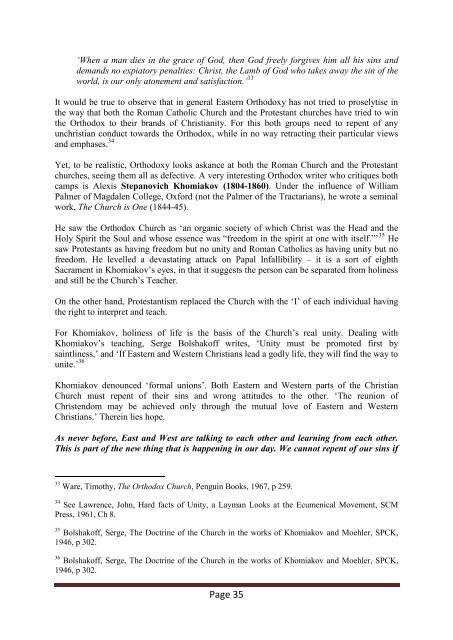Digging Out the Embedded Church - The Maranatha Community
Digging Out the Embedded Church - The Maranatha Community
Digging Out the Embedded Church - The Maranatha Community
You also want an ePaper? Increase the reach of your titles
YUMPU automatically turns print PDFs into web optimized ePapers that Google loves.
„When a man dies in <strong>the</strong> grace of God, <strong>the</strong>n God freely forgives him all his sins and<br />
demands no expiatory penalties: Christ, <strong>the</strong> Lamb of God who takes away <strong>the</strong> sin of <strong>the</strong><br />
world, is our only atonement and satisfaction.‟ 33<br />
It would be true to observe that in general Eastern Orthodoxy has not tried to proselytise in<br />
<strong>the</strong> way that both <strong>the</strong> Roman Catholic <strong>Church</strong> and <strong>the</strong> Protestant churches have tried to win<br />
<strong>the</strong> Orthodox to <strong>the</strong>ir brands of Christianity. For this both groups need to repent of any<br />
unchristian conduct towards <strong>the</strong> Orthodox, while in no way retracting <strong>the</strong>ir particular views<br />
and emphases. 34<br />
Yet, to be realistic, Orthodoxy looks askance at both <strong>the</strong> Roman <strong>Church</strong> and <strong>the</strong> Protestant<br />
churches, seeing <strong>the</strong>m all as defective. A very interesting Orthodox writer who critiques both<br />
camps is Alexis Stepanovich Khomiakov (1804-1860). Under <strong>the</strong> influence of William<br />
Palmer of Magdalen College, Oxford (not <strong>the</strong> Palmer of <strong>the</strong> Tractarians), he wrote a seminal<br />
work, <strong>The</strong> <strong>Church</strong> is One (1844-45).<br />
He saw <strong>the</strong> Orthodox <strong>Church</strong> as „an organic society of which Christ was <strong>the</strong> Head and <strong>the</strong><br />
Holy Spirit <strong>the</strong> Soul and whose essence was “freedom in <strong>the</strong> spirit at one with itself.”‟ 35 He<br />
saw Protestants as having freedom but no unity and Roman Catholics as having unity but no<br />
freedom. He levelled a devastating attack on Papal Infallibility – it is a sort of eighth<br />
Sacrament in Khomiakov‟s eyes, in that it suggests <strong>the</strong> person can be separated from holiness<br />
and still be <strong>the</strong> <strong>Church</strong>‟s Teacher.<br />
On <strong>the</strong> o<strong>the</strong>r hand, Protestantism replaced <strong>the</strong> <strong>Church</strong> with <strong>the</strong> „I‟ of each individual having<br />
<strong>the</strong> right to interpret and teach.<br />
For Khomiakov, holiness of life is <strong>the</strong> basis of <strong>the</strong> <strong>Church</strong>‟s real unity. Dealing with<br />
Khomiakov‟s teaching, Serge Bolshakoff writes, „Unity must be promoted first by<br />
saintliness,‟ and „If Eastern and Western Christians lead a godly life, <strong>the</strong>y will find <strong>the</strong> way to<br />
unite.‟ 36<br />
Khomiakov denounced „formal unions‟. Both Eastern and Western parts of <strong>the</strong> Christian<br />
<strong>Church</strong> must repent of <strong>the</strong>ir sins and wrong attitudes to <strong>the</strong> o<strong>the</strong>r. „<strong>The</strong> reunion of<br />
Christendom may be achieved only through <strong>the</strong> mutual love of Eastern and Western<br />
Christians.‟ <strong>The</strong>rein lies hope.<br />
As never before, East and West are talking to each o<strong>the</strong>r and learning from each o<strong>the</strong>r.<br />
This is part of <strong>the</strong> new thing that is happening in our day. We cannot repent of our sins if<br />
33 Ware, Timothy, <strong>The</strong> Orthodox <strong>Church</strong>, Penguin Books, 1967, p 259.<br />
34 See Lawrence, John, Hard facts of Unity, a Layman Looks at <strong>the</strong> Ecumenical Movement, SCM<br />
Press, 1961, Ch 8.<br />
35 Bolshakoff, Serge, <strong>The</strong> Doctrine of <strong>the</strong> <strong>Church</strong> in <strong>the</strong> works of Khomiakov and Moehler, SPCK,<br />
1946, p 302.<br />
36 Bolshakoff, Serge, <strong>The</strong> Doctrine of <strong>the</strong> <strong>Church</strong> in <strong>the</strong> works of Khomiakov and Moehler, SPCK,<br />
1946, p 302.<br />
Page 35








